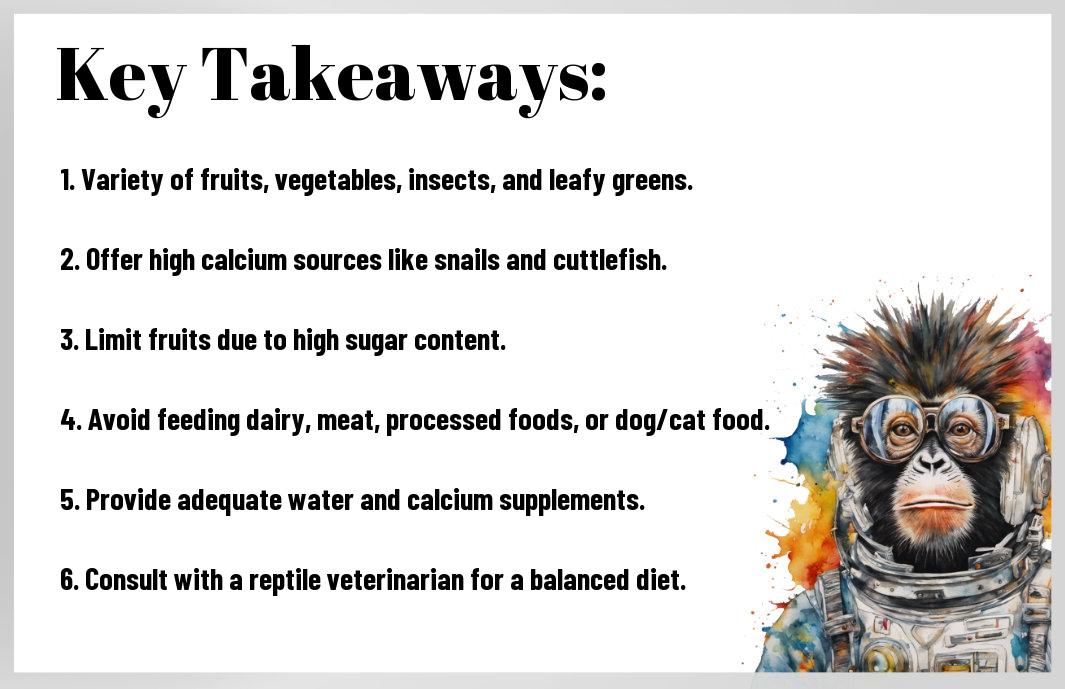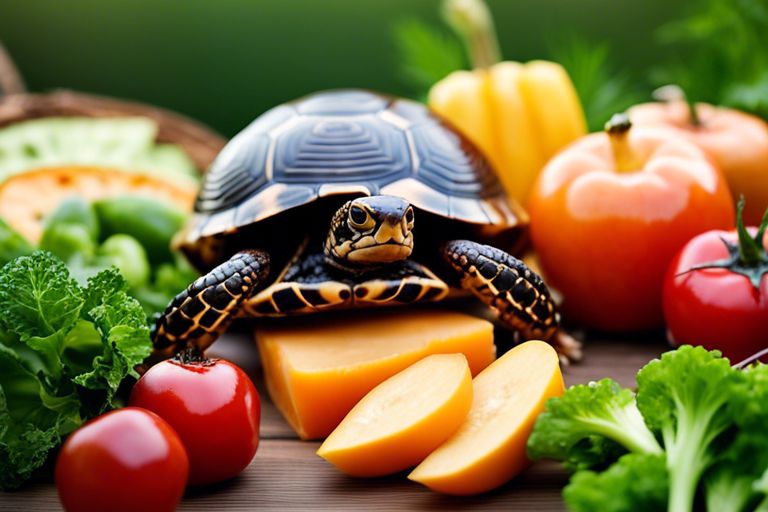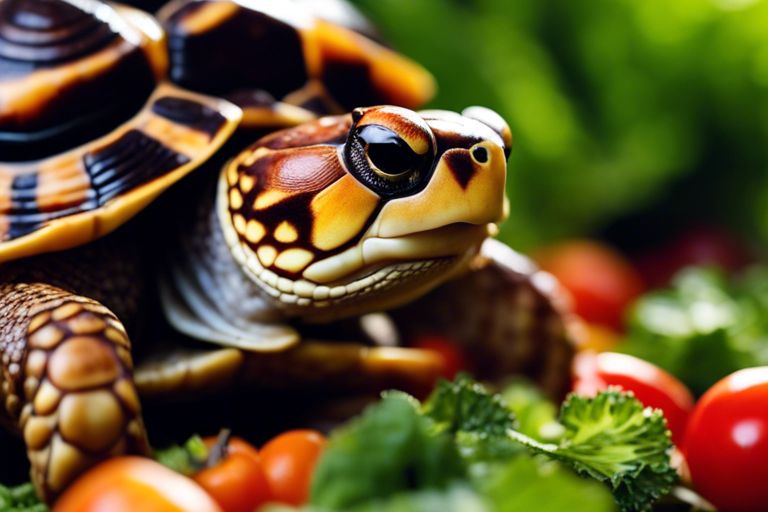Most new eastern box turtle owners often wonder what they should be feeding their beloved pets to ensure their health and well-being. Providing a balanced diet is crucial for the overall health of these unique reptiles. To keep them healthy and thriving, it is important to offer a variety of nutrient-rich foods that cater to their specific dietary needs. In this blog post, we will probe into the ideal diet for eastern box turtles, including safe options, dangerous foods to avoid, and essential supplements to keep them healthy and happy.
Key Takeaways:
- Variety is key: Offer a diverse diet including fruits, vegetables, protein sources, and leafy greens to ensure a balanced nutrition for your eastern box turtle.
- Calcium and Vitamin D3 are crucial: Provide calcium and Vitamin D3 supplements to help prevent metabolic bone disease and maintain healthy shell growth.
- Avoid toxic foods: Never feed your box turtle toxic plants, insects, or foods high in oxalates like spinach, kale, and beet greens as they can be harmful to their health.

Nutrition Fundamentals for Eastern Box Turtles
Now, when it comes to taking care of your Eastern box turtle, providing the proper nutrition is crucial for their health and well-being. Understanding their dietary needs is essential to ensure they receive the necessary nutrients to thrive.
Macronutrient Requirements
With Eastern box turtles, a balanced diet is key. They require a mixture of protein, carbohydrates, and fats to meet their macronutrient needs. Protein is essential for growth, tissue repair, and overall health. Sources of protein for Eastern box turtles include insects, snails, worms, and even the occasional small fish. Carbohydrates provide energy, and turtles can obtain them from vegetables and fruits. Fats are also important for energy and are found in foods like seeds and nuts. It is crucial to provide a variety of foods to ensure they receive all the necessary macronutrients.
Vitamins and Minerals Essentials
With Eastern box turtles, vitamins and minerals are just as important as macronutrients. These micronutrients play a crucial role in various bodily functions and overall health. Vitamin A is essential for vision and immune function and can be found in foods like carrots and dark leafy greens. Calcium is vital for shell and bone health, and turtles can obtain it from sources like kale and broccoli. Additionally, ensuring they have access to natural sunlight or UVB lighting is essential for proper vitamin D synthesis, which is crucial for calcium absorption.
Macronutrient balance is critical for Eastern box turtles, but so are the vitamins and minerals they need to thrive. Providing a varied diet rich in nutrients is the best way to ensure they stay healthy and happy. Consulting with a reptile veterinarian or specialist can also help tailor a diet plan specific to your Eastern box turtle’s individual needs.

Feeding Your Eastern Box Turtle
Safe and Healthy Food Choices
The key to keeping your Eastern box turtle healthy and thriving is to provide a balanced and nutritious diet. Vegetables, fruits, and protein sources should make up the bulk of their diet. Leafy greens such as kale, collard greens, and dandelion greens are excellent choices, providing essential vitamins and minerals.
Additionally, fruits like strawberries, blueberries, and apples can be given as treats to add variety to their diet. In terms of protein, options like mealworms, crickets, and snails can be offered occasionally to help supplement their diet.
Foods to Avoid
The Eastern box turtle should avoid high-fat and high-sugar foods such as processed foods, bread, and dairy products. Insects that have been exposed to pesticides should also be avoided as they can be harmful to your turtle’s health.
It is crucial to avoid feeding your turtle any toxic plants or insects as they can lead to serious health issues. It’s essential to research and properly identify any new foods before offering them to your turtle.
Plus, make sure to always wash any fruits and vegetables thoroughly before feeding them to your Eastern box turtle to remove any pesticides or harmful chemicals.
Feeding Schedule and Practices
How Often to Feed Your Turtle
An eastern box turtle’s diet consists of a variety of foods, including insects, fruits, vegetables, and even some commercial turtle diet. Your turtle should be fed every other day to ensure a balanced and nutritious diet. This schedule allows your turtle to consume the necessary nutrients without overfeeding, which can lead to obesity and health issues.
Monitoring your turtle’s appetite is crucial in determining how often to feed them. If your turtle consistently leaves food uneaten, you may be offering too much or too frequently. On the other hand, if your turtle seems to be eagerly awaiting each feeding, you can adjust the schedule accordingly.
Best Practices for Feeding
An essential practice when feeding your eastern box turtle is to ensure a variety of foods in their diet. This includes offering a mix of protein sources such as insects and worms, as well as leafy greens and fruits. Rotate their diet regularly to provide a range of nutrients and prevent nutritional deficiencies.
Proper hydration is also key in your turtle’s diet. Always provide fresh, clean water for your turtle to drink and soak in. Additionally, consider supplementing their diet with a calcium source, such as cuttlebone or calcium powder, to support their shell and bone health.
Avoid feeding your turtle only one type of food, as this can lead to imbalances in their diet. By offering a diverse selection of foods and following a consistent feeding schedule, you can ensure your eastern box turtle remains healthy and well-nourished.
Health Considerations and Diet Adjustments
For eastern box turtles, maintaining a balanced and nutritious diet is crucial for their overall health and well-being. However, there are certain health considerations and diet adjustments that may need to be made to ensure your turtle is receiving the proper nutrients it needs.
Recognizing Nutritional Deficiencies and Overfeeding
On occasion, a box turtle may experience nutritional deficiencies due to an inadequate diet. Signs of deficiencies include shell abnormalities, soft shell, slow growth, and lethargy. Conversely, overfeeding can lead to obesity, which can put strain on the turtle’s organs and lead to various health issues. It is important to monitor your turtle’s weight and overall appearance regularly to ensure they are receiving the appropriate amount of food.
In the event that you suspect your eastern box turtle is experiencing a nutritional deficiency or is being overfed, it is essential to consult with a veterinarian specializing in reptiles. They can provide guidance on adjusting your turtle’s diet and recommend any necessary supplements to help rectify the situation.
Adjusting the Diet for Age and Health Conditions
Conditions such as age and specific health issues can also impact a box turtle’s dietary needs. Young turtles require a diet higher in protein for growth, while older turtles may benefit from a diet lower in protein to prevent excessive weight gain. Additionally, turtles with health conditions such as metabolic bone disease may require specific adjustments to their calcium and phosphorus intake to support their recovery.
Considerations should always be made for the individual needs of your eastern box turtle when adjusting their diet. Consulting with a reptile veterinarian can help you create a custom-tailored diet plan that takes into account any age-related or health-related concerns your turtle may have.
Conclusion
From above, it is evident that an ideal diet for an Eastern box turtle includes a combination of fruits, vegetables, protein sources, and leafy greens. Ensuring a varied and balanced diet is crucial for their overall health and wellbeing. It is important to avoid feeding them toxic foods such as avocados, rhubarb, and dairy products. By providing a nutritious diet and proper care, you can help your Eastern box turtle thrive and live a long and healthy life.






Leave a Reply